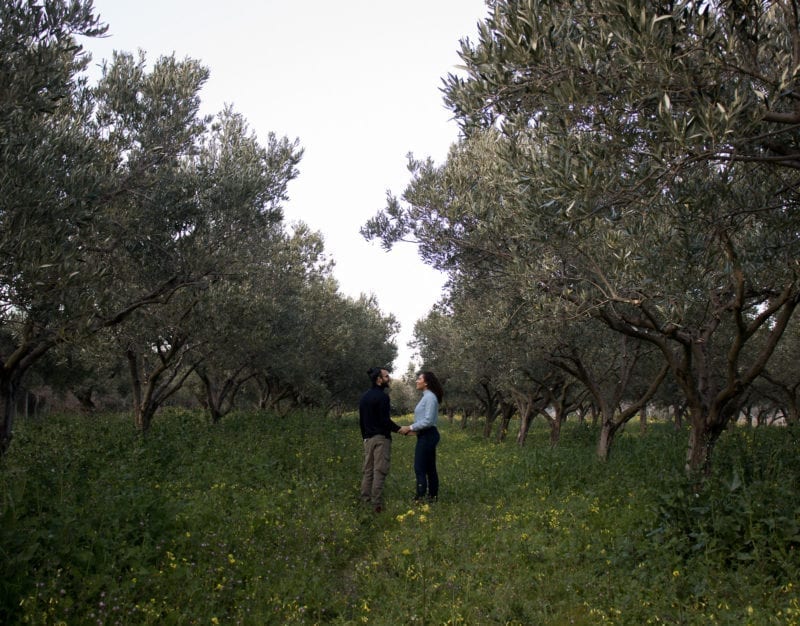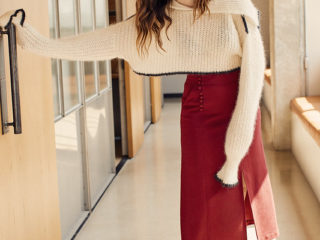“Real Women, Real Work” is a Darling series about everyday women who work in various fields including business, entertainment, science and education. We want to get to know the WHY behind their WHAT and get an inside look into different industries.
Skyler Mapes has always been big on the details. A native Californian who spent much of her childhood visiting wineries in Sonoma and Napa, she developed an avid appreciation for the intricacies of winemaking. Fast forward to summer 2014, while studying abroad in Barcelona and working as a design intern, one whimsical weekend trip to Rome forever changed Mapes’ detailed plans. There she met Giuseppe Morisani, a Calabrian personal trainer whose family worked in olive oil production on their estate above the Ionian Sea. Mapes’ new life plan was better than she could have imagined: She and Morisani married and launched a family business, EXAU Olive Oil.
The idea for their business was birthed shortly after the two married and moved to the Bay Area. Throughout their two years in California, Morisani’s dissatisfaction with the lack of quality Italian olive oil increasingly grew, which sparked an idea. In 2017, with the dream of bringing Morisani’s native Italian olive oils to American soil, the two packed their bags and moved to Calabria, Italy and launched their olive oil business.
“His dissatisfaction kind of started all of this,” Mapes recalled. “When we launched the brand, our family and friends were very receptive and curious of where Giuseppe was from. The olive oil served as a direct bridge between the U.S. and Calabria.”
Today, EXAU is an award-winning Italian olive oil company known for producing “One of the World’s Best Olive Oils.” The company is based in Austin, Texas, where Mapes runs all the digital marketing, product marketing and social media marketing. They travel back every year to Calabria, where all of the olives are grown on the family estate, in order to make their products. EXAU offers three quality, Calabrian oils—Avus, Lina and Turi—and delivers directly to customers in the United States.
Darling got to chat with Mapes about EXAU’s famous oil, her journey as an entrepreneur and her experience working in the agriculture industry as a Black American woman.
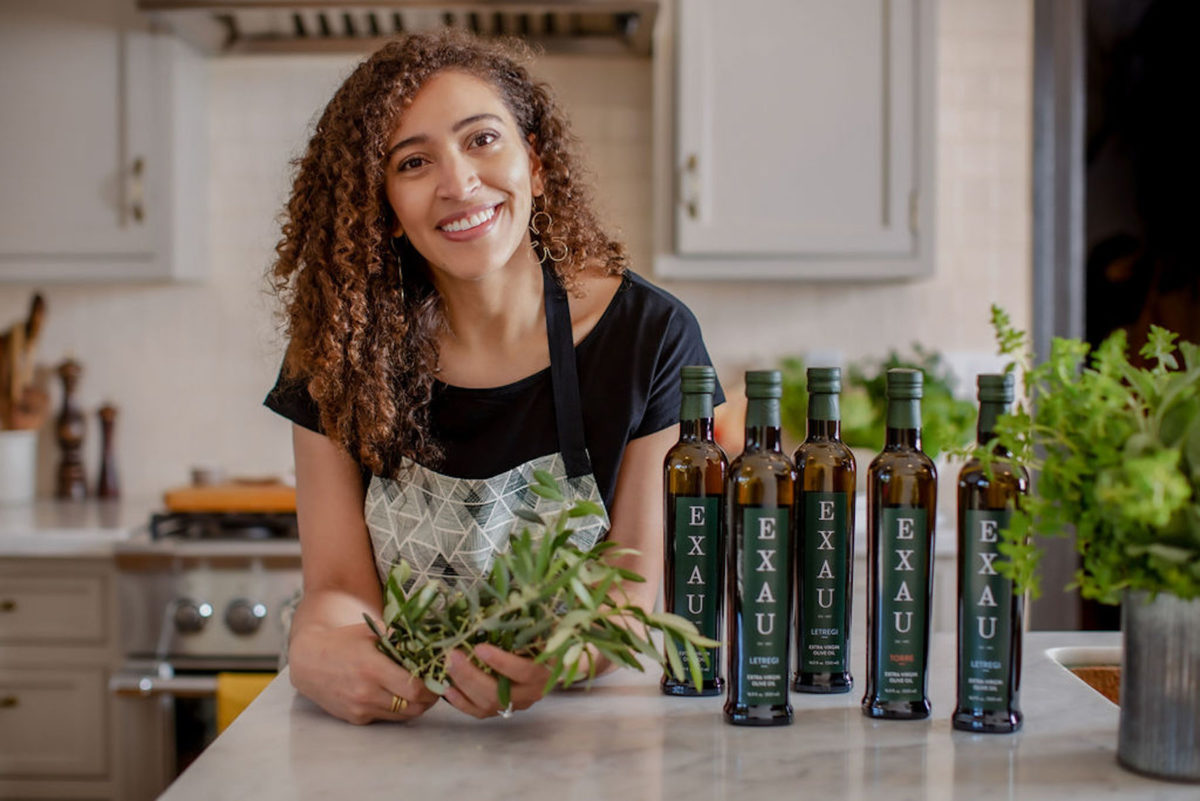
When you were a little girl, what did you imagine you would be when you grew up?
I wanted to be an architect. I came from a family of developers on my father’s side, mostly in the residential sector. I wanted to build and be in charge of creating beautiful, large residences. I wanted to dive deep into the design of creating those structures.
When I was a teenager, I became more interested in high-end design. It’s what I got my degree in. I worked at an architecture firm in the Bay area, where I was working on projects with huge budgets. I have always worked in industries that are not typical for women, which has allowed me to break down barriers for women.
As far as transitioning into olive oil production from architecture, I can say it was definitely not a clean break. It was more of me becoming curious about the food industry. I was just curious. Between my architecture job and working at a structural engineering firm, I went to work at a winery in the Bay area during harvest. Making olive oil is very similar to wine. The whole process of making this beautiful product felt special for me. The possibilities felt endless. In the design industry, I felt much more constrained.
Making olive oil is very similar to wine. The whole process of making this beautiful product felt special for me.
Guiseppe had suggested starting an olive oil company, and I thought it was wild. My friend at the winery, who is an entrepreneur and very outgoing, told me to give it a go. She told me if I was going to do it, I had to do it properly. Working under her gave me the experience and confidence I needed.
It was the perfect segue into making olive oil confidently and to understand the next steps we had to take. It was very labor intensive. I had never worked with a forklift or a giant crusher. This was a completely different ball game than working at my desk, clicking on my computer.
What was the process like of getting EXAU off the ground?
We decided in 2017 that the fall harvest was when we were going to make the oil. We were working with Mother Nature’s timeline. We moved back to Calabria in 2017 and stayed there for seven months to make the oil. We were harvesting olives, taking the olives to the press and going through the pressing process (which requires working with the right people to make a high quality olive oil), as well as going through the labeling and marketing process.
I did all the labeling and marketing on my own. We had three different oils, but didn’t have a name for the company yet. We just pulled everything together. You are creating this project that is delicious and you are excited to get it in people’s hands. It’s a special connection between you, the trees and the land.
You are creating this project that is delicious and you are excited to get it in people’s hands.
At first, we had a name that Giuseppe came up with, Ex Albis Ulivis, a reference to the young olives that are harvested green and were once only available to nobility. I told him it was way too long and that no one in the U.S. would understand Latin. So we shortened it to EXAU, and I instantly loved it!
We moved back to Italy to better understand the product. We wanted to master the craft of harvesting, bottling, labeling, exporting and importing. Once the oil arrived in the U.S., we started selling primarily to our family and friends. They’d come over to the house and we would show them how to taste. Soon, people started buying from us, and we started working local events, like fairs and food festivals, that allowed us to connect with the local community.
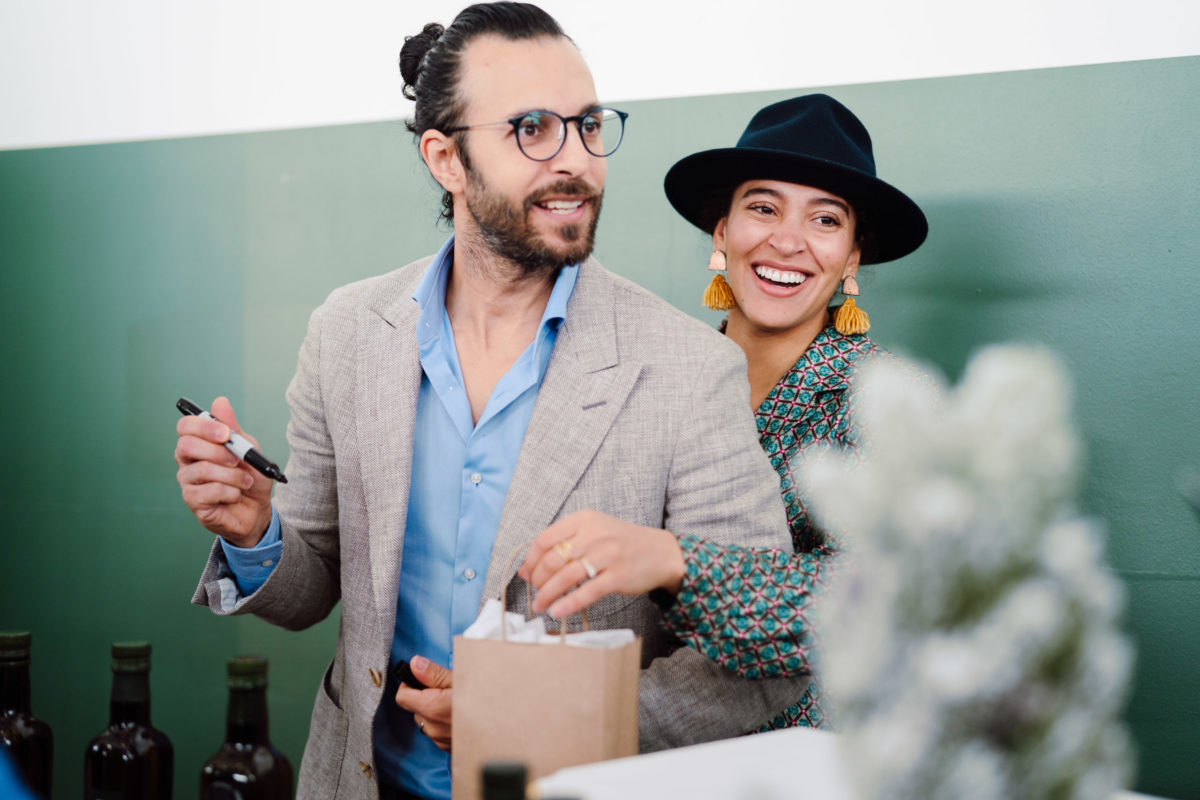
What is it like running a business with your husband? What unique talents do you each bring to the table?
I love running a business with Giuseppe, but of course, we have our challenges. As a married couple, if you get into a fight, you can’t go home to your husband and say, “I got into a fight with my coworker today.” For the most part, it’s pretty incredible because you get to make this product with your life and business partner.
I specialize in marketing and branding because my degree is in design. With architecture, you not only learn how to design a building but the entire brand of the building for visitors. I always felt comfortable working with the branding and marketing for EXAU. My experience at the winery also allowed me to move into production.
Giuseppe is a perfectionist. He is obsessed with the olive trees—everything from the angle in which they are cut, the testing of the soils and whether the soil is being tilled on these exact dates. He is big on production and sales. He focuses a lot on wholesale and retail. He also connects with the chefs a lot. If they are Italian chefs, then they are able to connect in an organic way and talk about life in the U.S.
What makes EXAU’s olive oils “elevated”? How is it different from American-made olive oils?
In Italy, there are more than 650 cultivars (cultivated varieties) of olive trees. In the U.S., there’s less than a quarter of that. The biodiversity of olives in Italy is so much broader. We grow Carolea olives, which are native to 70 kilometers of Calabria and the most popular varietal in the region. It’s a coastal tree, and because it’s native to the land, the trees grow very well there and are super healthy. They have the perfect balance of fruit and vegetable notes when they come out of the press.
Carolea is also used as a blending oil. It’s a very dense olive. We have to change the filter often because it’s so dense! We also do extensive testing to ensure our trees are really healthy. We have a low acidity level, and believe it’s really important to have lab testing done.
There’s also a few cultivars we have grown in the past that don’t exist in the U.S. yet. Calabrian oils are notorious for being medium-bodied and having the right amount of fruitiness to herbaceousness. You can use it on dessert, as well as something that’s savory.
You didn’t know a lot about the olive oil industry before starting your business. What were some important lessons you learned in launching your business?
You don’t need a lot. There’s a misconception that you need to run out and get all the things to start your business, all these unnecessary expenses. People waste a lot of money when first starting out. Consumers want something that’s good, and they want to trust whoever is making it. They want something of value.
Consumers want something that’s good, and they want to trust whoever is making it.
Before EXAU is an olive oil brand, we are olive oil educators. Providing that value to people is incredibly important. Let’s address the education first and then have a conversation about olive oil and where they can get it from. It’s not something physical like “buy one, get this $10 free gift.” There’s no price on education or understanding the industry better.
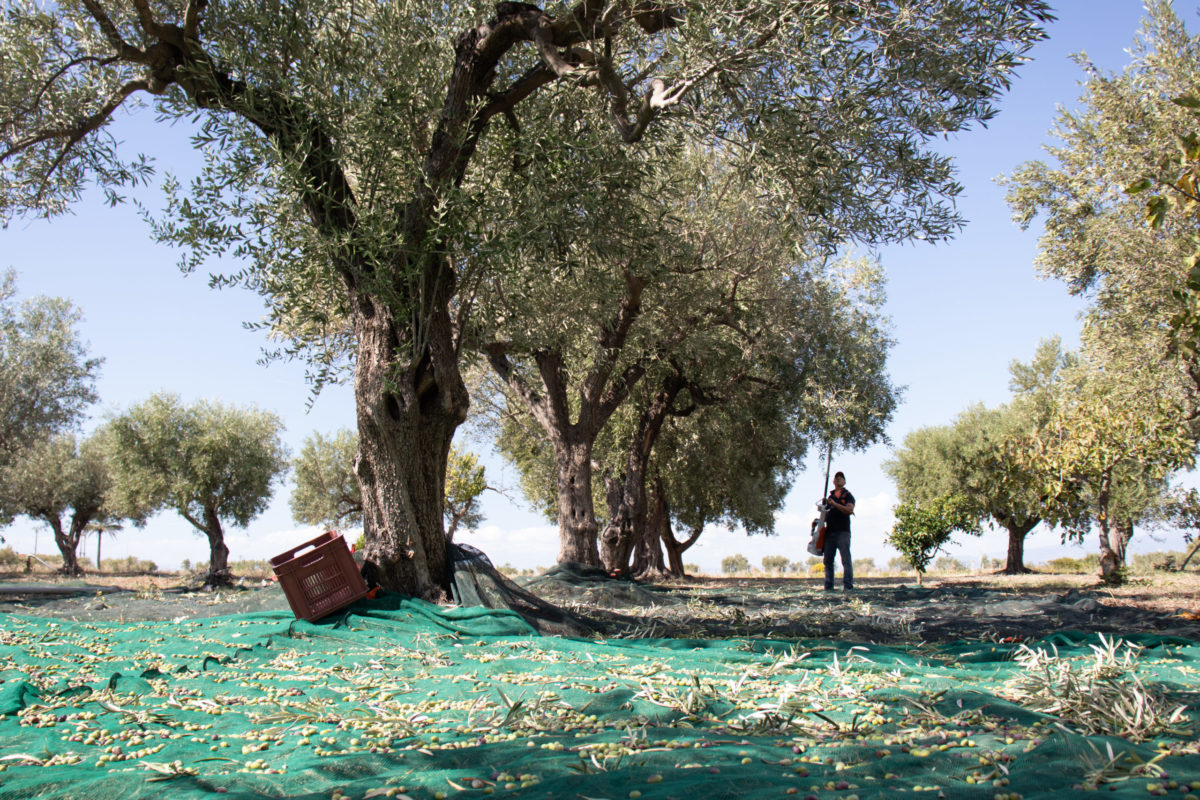
EXAU has seen a lot of success over the past few years, getting picked up by several grocery stores and selling out your online membership program twice. Have you guys been able to maintain business sales throughout quarantine? How have you been able to remain profitable?
We are in a unique situation because we are in the food industry. We are essential. If we were in a different industry, then we’d be having a different conversation right now.
We have limits on how much of our product we can make each year. From September through November, EXAU olive oils are harvested, pressed and bottled in Calabria. Toward the end of the year, they are imported to the U.S. The trees run EXAU, we don’t run EXAU. Once we run out of oil, we have to think about when we can make more and how much we can make.
With EXAU, we have to limit production and only make a certain amount right now, and people recognize that. People see the value in a quality product. It means we operate with integrity and understand our limits.
People see the value in a quality product.
With our online membership program, when we do sell out we still have products for our members. The members are excited to continuously get product. That’s one of the benefits of signing up!
What are some of your favorite EXAU products?
It’s hard. This is like asking who your favorite child is. I’d have to say Avus. It is rich and has so much depth. My favorite recipe to use it with is Pasta Aglio e Olio. It’s just olive oil, garlic, parsley and parmigiano reggiano. It’s simple and comforting. It reminds of an adult version of mac ‘n cheese. It makes me very proud when I consume our products.
What has been your go-to quarantine recipe to make with EXAU oils?
Pasta Aglio e Olio—it’s a recipe on our website. It’s my favorite! It’s flexible and perfect for vegans (skip parmigiano) and vegetarians. I can never get tired of eating it. I could eat that dish my entire life and be so happy.
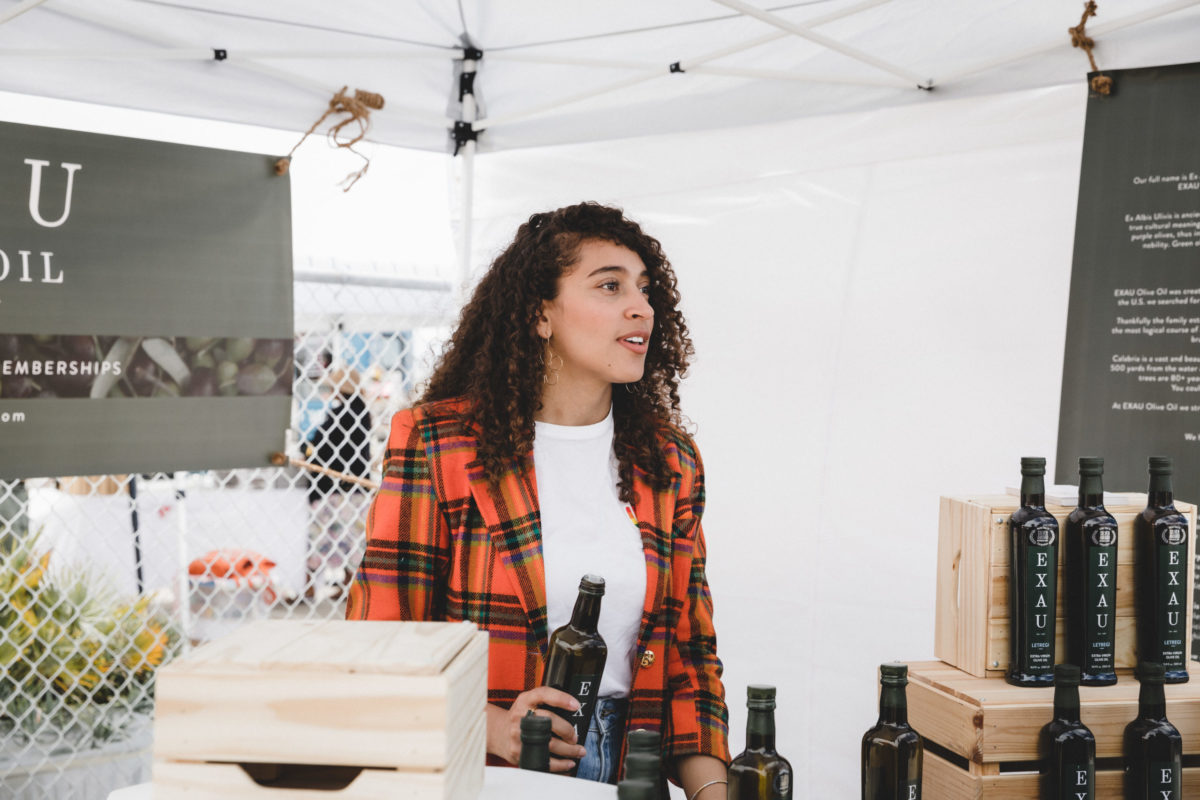
You are an American, a Black woman and an olive oil producer. What has been your experience working in agriculture?
It’s been different depending on where I am. In California, I have found it much more difficult to break into the industry and make allies than I have in Calabria, which is the complete opposite of what I expected. We have this mentality of Italians being pious about their food, but when it came to learning something new and going to the press, I didn’t feel intimidated in Calabria.
In California, however, I was not greeted very well. When I go to the press in Calabria (where I have been pressing oils for the last few years), they ask about our families and the oils and how business is going into the U.S. They are so proud.
Calabria is family-owned, farm country. There’s a lot of older men at the press, and sometimes, they kind of stare but they are just curious. When they find out that I am an American woman that owns a Calabrian olive oil company they smile. Then, they call me an old-fashioned, Calabrian woman because, back in the day, a lot of women used to do the harvesting and pressing because many men were off at war. I think how they welcome me is very beautiful.
In the U.S., as far as sales, I have had a lot of trouble. A lot of buyers do not respond to my emails or accept my calls. Yet, if my husband calls, they respond to his male voice and Italian accent. Unfortunately, nobody talks about the barriers for women in the industry. I haven’t even talked about it until now. I always thought, “This is just kind of the way the industry is.” Once Black Lives Matter came back in full force, I started wondering what is really going on.
Nobody talks about the barriers for women in the industry.
I know only one other Black olive oil producer. I can list off an entire stream of white men who make wine. It just doesn’t make sense. The olive industry is a space that has not changed in a long time. People have been making olive oil for thousands of years, and the fact that it has not evolved in the past six years is problematic.
How do you navigate perceived bias associated with gender or race?
Before, I didn’t say anything because I didn’t know what to say. Now, I plan to email the buyers and say, “Look, let’s go over your olive oil shelf. Here’s what I have to say about it. This is what you have on your shelf and this is what is missing.”
I know a lot of the producers, and I know the brands. Right now, I don’t have a lot of product to sell. So I can’t criticize it, but when I do have products, we are going to be pursuing more wholesale accounts. I am going to be emailing these buyers. They can either have a conversation with me, or we can have a conversation with this entire community about how they have no Black olive oil producers on their shelves.
This is not just about me. It’s so much bigger. It’s wanting to see change in the entire industry as a whole. If there’s another Black-owned olive oil producer on their shelves, then I will be so happy for them.
This is not just about me. It’s so much bigger. It’s wanting to see change in the entire industry as a whole.
When I get approached by buyers, it’s mostly middle-age, white men. We don’t see a lot of brands in high-end grocery stores with oil from Black-owned brands. My courage to speak up has come from me wanting to see more Black people and Black-owned brands in the olive oil industry and wine industry. If I can hold the door open for someone coming behind me, then I’m going to do that.
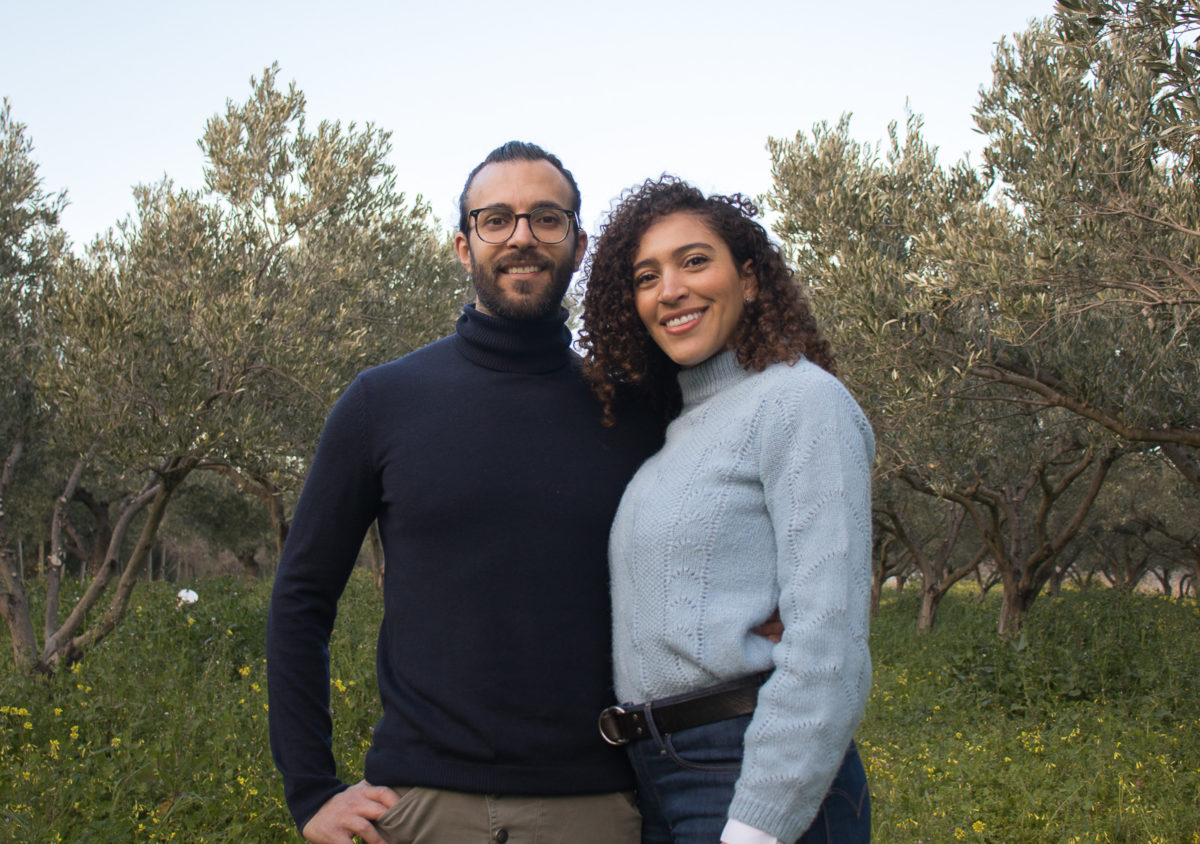
What are some future goals for yourself and the company?
A personal goal is to be able to mentor a woman of color, particularly a Black woman who wants to get into the olive oil or the wine industries and learn about the product as a whole. Our work is so hands on. I can’t just teach a Zoom class. We need to have someone next to us and go through the whole process together. I think it’s the only way to get more people who look like me in this space.
As a company, we want to keep growing and educating people about olive oil. We want to share the health benefits of olive oil with consumers. Really what we do as a company is let customers know there’s information out there about the benefits of olive oil, and we lead them to the location of that information.
What advice would you give to women of color who are interested in entering traditionally male-dominated or predominantly white industries?
I would say go in and keep going. Know that you are going to stir things up. Find your allies. There are going to be people who want to help you, but you just have to find them.
Knowing what you know now about starting a business and working in olive oil production, what advice would you give your younger self?
Be patient. Give yourself time to succeed. Keep going.
Success is not found overnight. It’s perceived that way because people work for five or 10 years. Then, they get their brand in front of people, but those people don’t see the process that goes into it. Give your brand time to succeed.
Follow along on Instagram to learn more about Skyler Mapes and EXAU. Find her and the brand on Facebook as well. To sign up for EXAU’s membership program and learn about the latest products, join the waitlist here. Lastly, subscribe to the EXAU Monthly Newsletter.
Feature Image via Madeline Farin at the Loyale Studio

